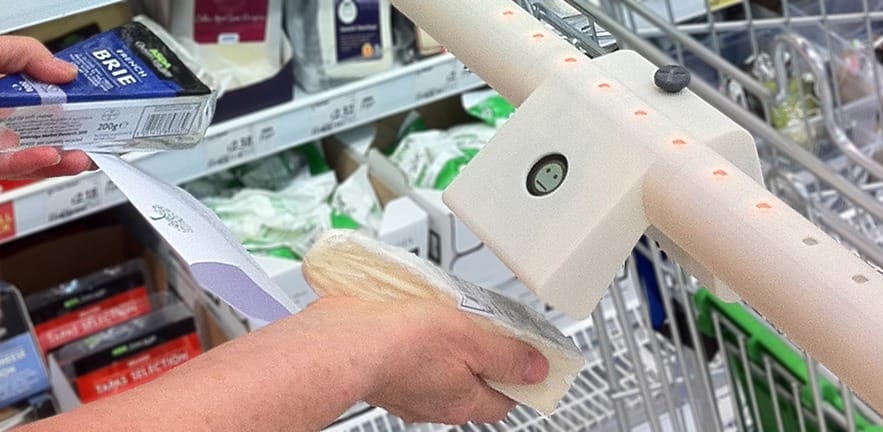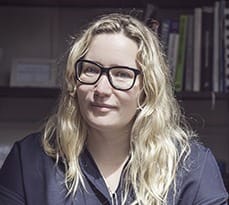Fancy tasting a mushroom ketchup, mango chutney, or honey and elderflower cube?

These are just a few of the quirky 3D printed food offerings made by Dovetailed, a Cambridge-based creative design studio and innovation lab. Dovetailed is led by an alumna of several programmes at Cambridge Judge Business School, Vaiva Kalnikaitė. We met with Vaiva to talk about entrepreneurship and innovation.

The company, which just celebrated its sixth birthday, isn’t just focused on food: it’s also working with various organisations such as universities, museums and software companies to offer other creative user-centred products and services.
One of their latest creations is a hat with an interactive feather that starts moving when it senses a surveillance camera nearby, so the person can choose another route if they don’t like the idea of being recorded. Other pilot projects include a shopping basket handle that provides information about food products and nudges people to choose local and more healthy products and a “smart” milk carton-shaped device that sits in your fridge and collects data on food products that are about to expire – information that can be shared with others to reduce food waste.
When asked how she comes up with such innovative ideas, Vaiva said it’s not difficult to think of new ideas, but many people don’t take it much further so some good ideas never materialise. “I’m just naturally curious and get interested in various disciplines. This helps me connect things that might involve multiple fields. I also like observing people and understanding their pain points, which also often leads to new ideas.”
A native of Lithuania, Vaiva is a serial learner at Cambridge Judge. In 2013 she completed the General Management Certificate of Achievement (GMCA) run by the School’s Executive Education division; in 2012 she attended EnterpriseWISE and in 2016 Ignite programme – both run by the Entrepreneurship Centre at Cambridge Judge. Now she is on the Accelerate Cambridge programme, also part of the Entrepreneurship Centre, to get guidance on a business model for the 3D food printer that’s been given the title “nūfood”, and is now a separate venture.
Vaiva earned her PhD in Human-Computing Interaction at the University of Sheffield, and says she has always been interested in psychology and new technologies. She also loves art, and was involved in art projects at school. So her current venture – Dovetailed – ticks all the boxes.
But how did it all start? “After my studies in Sheffield I was working for General Electric and the software company Aveva. But after some time I thought it would be interesting to work on more creative and disruptive technology projects, so I decided to launch my own business.”
In 2014 Dovetailed organised and ran a FoodTech Hackathon in Cambridge, where participants were asked to come up with new ideas on how technology can help people make better choices about food. That’s where the idea for 3D food printing was born.
After the event the team kept experimenting with what could be printed with this new technology and what materials could be used. Edible liquid is more difficult to print than some other materials and that’s what intrigued the team. The work resulted in the creation of the nūfood “robot” in 2014, and since then the device has been touring the world to showcase innovative food creations.
Today Dovetailed has a strong team of eight people in roles covering user experience and industrial design, user research, software engineering, chemistry and physics. They are currently looking to hire another user researcher.
Vaiva has two female employees at the moment and sees herself as an equal opportunities employer so is keen to encouraging applications from all potential candidates with the right skills and experience.
We asked Vaiva about the low numbers of women in STEM professions and what might change this. She reckons women need to be more proactive and ignore stereotypes: “I never thought that software engineering is a male profession. I was interested in it and nobody could have stopped me from studying this. There were only a few other female students in my group, but I got along with everybody and disregarded the stereotypes.”
Looking ahead Dovetailed wants to explore and apply human psychology to their research. Dovetailed together with the Engineering and Physical Sciences Research Council (EPSRC) are co-funding a PhD student at the University of Leicester to explore new projects, for example how sound, light and colour can change our perception of food, or how virtual reality can affect our sense of taste.
What’s the secret of her success? A great team, Vaiva says, but also resilience. Her advice to entrepreneurs: “Relax and keep going! Also be open to different possibilities and be prepared to pivot. The best entrepreneurs I’ve met are very caring, relaxed, curious and well-rounded individuals.”
Vaiva is interested in hearing from…
anybody who is excited by what the Dovetailed team are doing.

